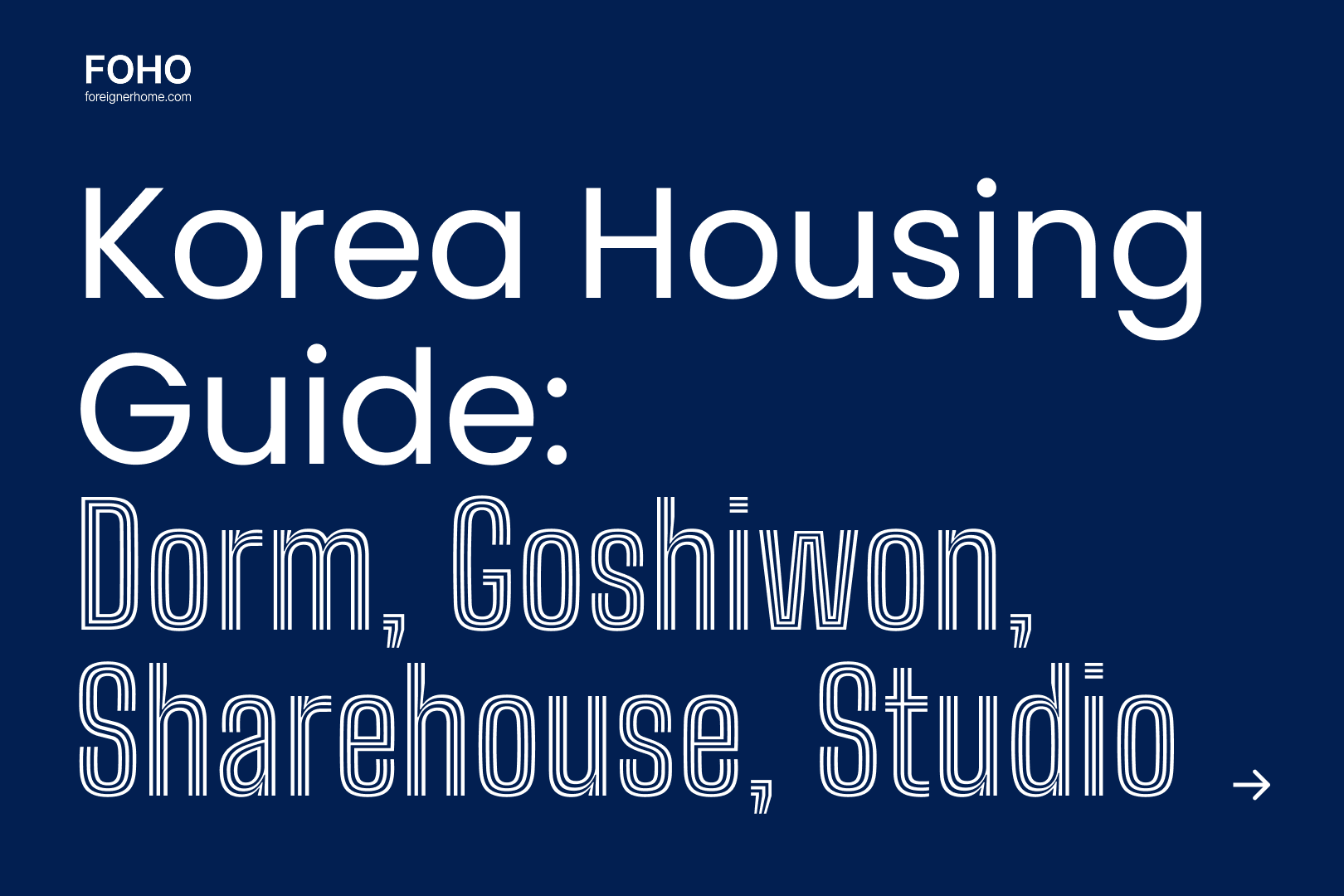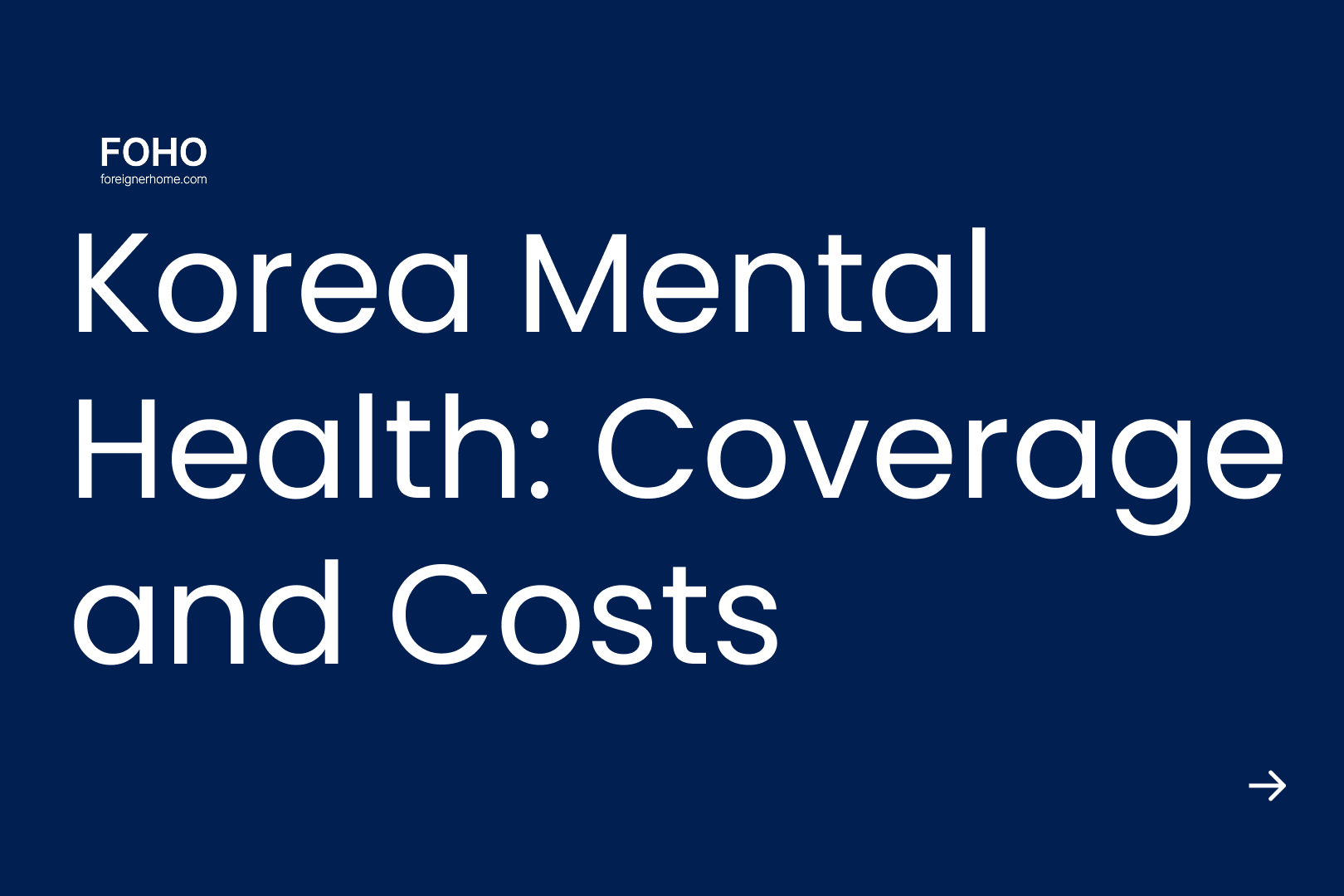FOHO Blog – Global Housing & Living Guide for Foreigners
Korea Housing Guide 2025: Dorms, Goshiwons, Sharehouses, and Studio Apartments Explained
A complete housing guide for international students and professionals in Korea. Compare dormitories, goshiwons, sharehouses, studios, and corporate residences with updated costs, rules, and practical tips to choose the best place for your stay.

Table of contents
- 01The Practical Housing Guide to Korea (2025): Dorms, Goshiwons, Sharehouses, Studios & Corporate Residences
- •1) What each option really feels like
- •2) Side-by-side comparison (2025 typical ranges)
- •3) Decision flow (use this, not guesswork)
- •4) Hidden costs and fine print you should check
- •5) Visit checklist (15 minutes that can save months of regret)
- •6) Three realistic scenarios (how people actually choose)
- •7) Budget planner (start conservative)
- •8) Application timing & documents
- •9) Red flags to watch (walk away if you see these)
- •10) Quick glossary (for smooth translation later)
- •11) Print-friendly pre-move checklist
The Practical Housing Guide to Korea (2025): Dorms, Goshiwons, Sharehouses, Studios & Corporate Residences
- Here <4 months: Goshiwon (ultra-budget private room) or Sharehouse (community + furnished).
- 1 semester or more (students): University Dorm first, else Sharehouse near campus.
- 6–12 months (professionals): Company residence if available; else Studio/Officetel.
- Need zero deposit & instant move-in: Goshiwon / some Sharehouses.
- Need privacy + kitchen + your schedule: Studio/Officetel (higher cost, deposit).
1) What each option really feels like
A. University Dormitories
- What you get: Shared rooms (2–4 beds common), campus security, dining halls, laundry, study lounges.
- Why people pick it: Safest, cheapest per month, built-in social life next to classes.
- You trade off: Curfew/visitor rules, less privacy, fixed application windows.
- Who fits: Exchange/degree students who value structure and savings.
B. Goshiwons (고시원)
- What you get: Tiny private room (bed + desk + storage), shared kitchen/bath, utilities bundled; often rice/kimchi included.
- Why people pick it: Lowest upfront cost, no long lease, immediate move-in.
- You trade off: Very small space, thin walls, maintenance varies; English support not guaranteed.
- Who fits: Short stays, exam period, tight budget, independence over amenities.
C. Sharehouses (Co-living)
- What you get: Private bedroom + shared kitchen/living room; furnished; bills usually included; weekly cleaning common.
- Why people pick it: Balance of community + cost control; many houses are international-friendly.
- You trade off: Shared bathrooms/kitchen, housemate compatibility matters.
- Who fits: Students & young professionals wanting friends and routine.
D. Studios / Officetels (원룸/오피스텔)
- What you get: Entire private unit with kitchenette and bathroom; often furnished; some buildings have gym/parking.
- Why people pick it: Privacy, flexibility of schedule, cook anytime, quiet.
- You trade off: Higher monthly rent and deposit; typical leases 6–12 months; documents may be needed.
- Who fits: Professionals, couples, anyone staying ≥6–12 months who prioritizes privacy.
E. Company Residences / Serviced Apartments
- What you get: Employer-arranged dorms or serviced apartments (kitchenette + cleaning); heavy subsidies are common.
- Why people pick it: Minimal cost and paperwork; reliable management.
- You trade off: Tied to job/location; leave when the contract ends; company rules may apply.
- Who fits: Interns, transferees, expats with HR support.
2) Side-by-side comparison (2025 typical ranges)
Note on ranges:
Option | Typical Monthly Cost | Deposit / Upfront | Lease Flexibility | Rules & Support | Privacy & Space | Best For |
Dorm | ₩200k–₩450k (effective/month, semester billing) | Minimal; health docs common | Fixed semesters | Strong security, curfew common | Shared rooms; shared baths | Students prioritizing cost & campus life |
Goshiwon | ₩300k–₩500k (utilities incl.) | Often none | Weekly / monthly possible | Light rules; language varies | Private tiny room; shared baths/kitchen | Short stays, minimal budget |
Sharehouse | ₩400k–₩900k (most incl.) | Small (₩0–₩500k typical) | Month-to-month common | House rules; cleaning often | Private room; shared spaces | Community-minded students/YPs |
Studio/Officetel | ₩700k–₩1.2M+ | 1–2 months’ rent (or more) | 6–12 months typical | Building mgmt; fewer rules | Full privacy, kitchen & bath | Professionals staying ≥6–12 months |
Company Residence | Often low or subsidized | N/A or small | Tied to employment | HR support, cleaning possible | Private or semi-private | Interns, transfers, expats with benefits |
3) Decision flow (use this, not guesswork)
- Stay length?
- ≤4 months → Goshiwon or Sharehouse.
- 1 semester → Dorm (apply early).
- ≥6–12 months → Studio/Officetel (or Company residence if offered).
- Upfront cash available?
- <₩500k → Goshiwon / Sharehouse.
- ≥1–2 months’ rent deposit → Studio/Officetel options expand.
- Lifestyle priority?
- Safety/structure/campus → Dorm.
- Lowest cost + immediate move-in → Goshiwon.
- Friends/community + furnished → Sharehouse.
- Privacy + kitchen + quiet → Studio/Officetel.
- Minimal hassle + cleaning → Company residence/serviced apt.
4) Hidden costs and fine print you should check
- Utilities & internet: Included (goshiwon/sharehouse often), separately billed (many studios).
- Maintenance/cleaning: Dorms/company/serviced often include; sharehouses: common-area cleaning weekly; studios: you handle it.
- Building fees: Some officetels charge monthly maintenance (관리비). Ask what’s included (heating, water, internet, parking).
- Furniture/appliances: Goshiwon/sharehouse are normally furnished. Studios: confirm fridge, washer, bed.
- Noise & insulation: Older buildings can be loud; bring earplugs; check windows/heating.
- Contract terms: Minimum stay, move-out notice, subletting rules, early termination penalty.
- Documents: Passport, visa/ARC, employment or enrollment proof; studios may ask for a guarantor.
5) Visit checklist (15 minutes that can save months of regret)
- Window opens/locks; mold signs; smell of damp; heater/AC works; sunlight at noon?
- Stand quietly 60 seconds; listen for traffic, neighbors, pipes, elevator motors.
- Hot water in 30–60 seconds; drainage; ventilation fan; water pressure.
- Stove ignites; sink drains; visible pests; fridge seals; cooking smell pathways.
- Speed test on phone; signal in room; where is router?
- Digital door lock; building CCTV; fire extinguisher/sprinkler; emergency exit map.
- What exactly is in the monthly total? Any seasonal heating surcharge? Deposit refund timeline & condition list in writing.
6) Three realistic scenarios (how people actually choose)
Exchange student (4–6 months)
- Shortlist: Dorm → Sharehouse → Goshiwon.
- Why: Dorm for lowest cost & campus life. If dorm is full, sharehouse balances community and comfort. Goshiwon for late arrivals needing instant, no-deposit rooms.
Corporate intern / transferee (6–12 months)
- Shortlist: Company residence → Serviced apartment → Studio.
- Why: HR paperwork and subsidies reduce friction. If no company housing, consider serviced apartments first month, then move to a studio after viewings.
Language student / freelancer (3–12 months)
- Shortlist: Sharehouse → Studio (if budget allows) → Goshiwon (if saving).
- Why: Sharehouse gives community & predictable bills; studio for quiet work if you can cover deposit.
7) Budget planner (start conservative)
Item | Dorm | Goshiwon | Sharehouse | Studio/Officetel |
Monthly Rent (KRW) | 200k–450k | 300k–500k | 400k–900k | 700k–1,200k+ |
Utilities/Internet | often incl. | incl. | usually incl. | + 50k–150k |
Transport (subway/bus) | 40k–70k | 40k–70k | 40k–70k | 40k–70k |
Food (student) | 250k–400k | 250k–450k | 250k–450k | 300k–500k |
One-time Costs | minimal | minimal | small deposit | deposit 1–2 mo. rent |
8) Application timing & documents
- Dorms: Apply 6–10 weeks before semester via your university’s International Office; prepare health docs and proof of enrollment.
- Goshiwon/Sharehouse: Can secure 1–4 weeks before arrival; some accept same-week move-in.
- Studios/Officetels: Plan 2–4 weeks for viewing, negotiation, contract signing, and key handover.
- Company Residences: Ask HR immediately after offer/assignment.
9) Red flags to watch (walk away if you see these)
- “All cash, no contract” for long stays.
- Refuses to itemize total monthly (rent + utilities + building fees).
- Mold smell, poor ventilation, no fire safety equipment.
- Deposit refund terms not written in contract.
- Key handover promised before contract signed and stamped.
10) Quick glossary (for smooth translation later)
- Goshiwon (고시원): Tiny private room with shared facilities; utilities often included.
- Sharehouse (쉐어하우스): Private bedroom + shared kitchen/living room.
- One-room (원룸): Studio apartment.
- Officetel (오피스텔): Studio in mixed-use building; common for singles.
- Wolse (월세): Monthly rent with smaller deposit.
- Jeonse (전세): Large lump-sum deposit; little/no monthly rent.
- Maintenance fee (관리비): Building fee (ask what’s included).
- ARC (외국인등록증): Alien Registration Card.
11) Print-friendly pre-move checklist
- Choose stay length and top two priorities (budget / privacy / community / location).
- Shortlist 3–5 neighborhoods near study/work + subway lines.
- Prepare documents (passport, visa/ARC, student/employment proof).
- Message 5–10 listings with your template; compare total monthly.
- Schedule in-person or video tours; use the 15-minute visit checklist.
- Confirm contract terms in writing: deposit amount, refund conditions, utilities, move-out notice.
- Keep 10–15% budget buffer.
Final note
Make Your Korea Rental Simple — with FOHO
- Fast payments for deposit and monthly rent—no awkward transfers
- Clear landlord communication from first message to after move-in (real human support)
- Wide, up-to-date listings for students and professionals
- Flexible, friendly help in plain language
- Tell us where, budget, and move-in date
- We share suitable options and handle messages with landlords
- You move in with confidence
- Find a place → We’ll send options that fit your timeline and budget
- List your room (for landlords) → Simple posting, quick responses, and polite tenant communication
Settle in faster with FOHO
Browse more verified listings and message landlords in minutes. Lock in your lease with FOHO's secure payments.
Get Foreigner-Friendly Housing Tips
Get the latest news delivered to your inbox.

Nov 4, 2025
FOHO Launches Foreigner-Focused Rental Insurance
FOHO’s deposit insurance protects foreign tenants in Korea from landlord defaults. Stay safe with clear coverage and fast claims.

Oct 31, 2025
How to Convert E-9 Visa to E-7-4 in Korea
A guide for Vietnamese & Chinese E-9 workers in Korea. Learn the E-7-4 visa points system, F-2 requirements, and compare GME vs. Sentbe for remittance.

Oct 30, 2025
How to Avoid Deposit Scams in Korea: A Guide
Avoid deposit scams in Korea with our step-by-step guide. Learn to check property debt, understand the 'Deung-gibu,' and secure your deposit.

Oct 29, 2025
Korea Mental Health: NHIS Coverage and Costs
Get help with mental health in Korea. This guide for foreigners explains how to use NHIS, find low-cost options, and get medication prescriptions locally.
Subscribe to the FOHO newsletter
Actionable housing insights in your inbox.